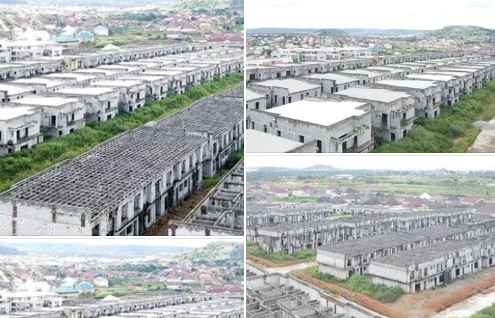The Economic and Financial Crimes Commission (EFCC) has recovered 753 duplexes and other apartments in the Cadastral Zone in Nigeria’s federal capital city, Abuja, linked to former Central Bank of Nigeria (CBN) Governor Godwin Emefiele.
EFCC described the recovery as the “largest single recovery by the EFCC since its establishment in 2003.”
However, the EFCC has officially refused to admit the identities of the property owners, citing legal provisions under the Advance Fee Fraud Act. Nonetheless, court papers in circulation, with which the anti-graft agency obtained a court ruling of forfeiture of the property to the federal government, indicated Mr. Emefiele as the culprit.
EFCC Spokesman Dele Oyewale clarified that revealing names at this stage would be unprofessional since a “substantive criminal investigation on the matter” is still ongoing.
The court ruling was issued by Justice Jude Onwuegbuzie of the FCT High Court in Apo on December 2, 2024.
Emefiele is currently being prosecuted in three separate cases involving charges of procurement fraud, forgery, and other offences. These include allegations of fraud totalling $4.5 billion and ₦2.8 billion, along with a claim that he authorized the printing of ₦684.5 million notes at a cost of ₦18.96 billion.
The EFCC alleged that Emefiele was involved in “significant fraudulent activities during his tenure as CBN governor“, claiming he facilitated kickbacks for foreign exchange allocations and received illegal payments from contractors.
According to the EFCC, he used three companies to acquire the Cadastral Zone properties, paying a total of ₦2.2 billion through payments of ₦900 million, ₦700 million, and ₦600 million.
The directors of these companies have been arrested, and their statements have been obtained.
The court issued an order of temporary forfeiture of the property on November 1, 2024. With no one disputing the evidence, the court then proceeded to issue an order of permanent forfeiture of the property to the Federal Government.
The EFCC described this decision as a “significant victory in the fight against corruption.”
Yet, the key question is how federal government officials will now manage the forfeited assets. Will they ensure transparency to benefit the nation, or will these assets become entangled in corruption?
Comment, Like 👍, share this article, and Follow us on our social media handles.







